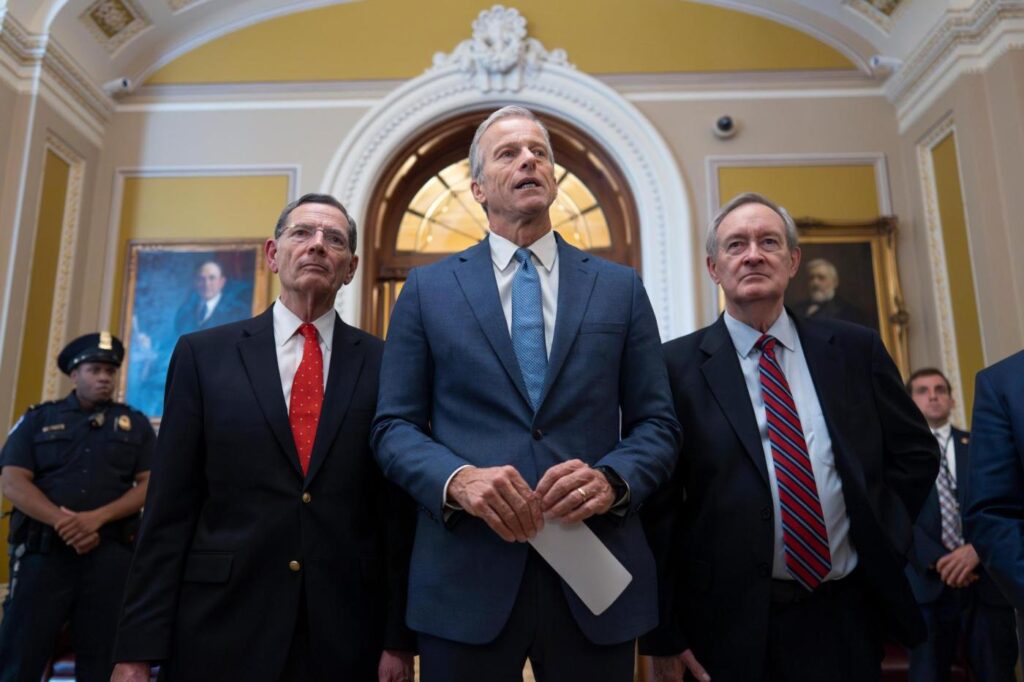WASHINGTON (AP) — Approximately 11.8 million adults and children could face the loss of health insurance if the Republican-backed domestic policy package, known as the “One Big, Beautiful Bill Act,” becomes law. The potential losses, however, will not occur immediately. Instead, the bill proposes gradual changes over a decade, targeting federal health care programs such as Medicaid, the Affordable Care Act (ACA), and the Children’s Health Insurance Program (CHIP) to extract nearly $1 trillion in savings.
The proposed legislation threatens to reverse years of progress in health insurance coverage in the United States, which has seen record enrollment numbers and federal spending. Currently, around 78 million individuals are covered by Medicaid, while 24 million are enrolled in ACA marketplaces. Medicaid, a joint federal-state program, operates under various names across states, such as Medi-Cal in California and MassHealth in Massachusetts.
Impact on Medicaid and ACA Enrollees
Under the GOP plan, Medicaid and ACA enrollees will face increased scrutiny regarding their income and eligibility. States will be required to verify Medicaid eligibility every six months. This frequent verification poses challenges for vulnerable populations, such as the homeless or transient individuals, who may miss government notices requiring them to submit paperwork.
“The life experience of these individuals is not necessarily one that allows them the luxury of having to work through onerous paperwork,” stated Martha Santana-Chin, CEO of L.A. Care Health Plan, which serves millions of Medicaid recipients in Los Angeles. Historical data from Texas, where increased eligibility checks between 2014 and 2019 led to thousands of children losing coverage, underscores the potential impact of such measures.
“The life experience of these individuals is not necessarily one that allows them the luxury of having to work through onerous paperwork.” — Martha Santana-Chin
Additionally, ACA marketplace enrollees will face penalties if their actual income exceeds their reported income during enrollment, requiring government verification before coverage is granted. This contrasts sharply with employer-based coverage, which typically renews annually without such checks.
Children’s Health Insurance Program and Immigrant Coverage
The GOP bill also proposes changes to CHIP, allowing states to delay children’s enrollment if parents are behind on premium payments. Premiums can reach up to $100 monthly in some states, according to the health policy research firm KFF. Furthermore, states may introduce waiting periods for children transitioning from private insurance to Medicaid, reversing protections established by the Biden administration.
For immigrants, the bill narrows eligibility for ACA subsidies and reduces federal funding for states offering Medicaid to undocumented immigrants. This reduction in federal support may lead states to terminate such programs, as seen in California’s recent freeze on new Medi-Cal enrollments for immigrants and Illinois’s program halt.
Work Requirements and Dual Enrollment Challenges
The most significant coverage losses are anticipated from the proposed work requirements. Individuals aged 19 to 64 must work, volunteer, or attend school for at least 80 hours monthly to qualify for Medicaid, with exemptions for those who are disabled, pregnant, or parents of young children. While most Medicaid enrollees already meet these criteria, bureaucratic hurdles and lack of access to necessary resources could still result in coverage loss.
Arkansas’s 2018 attempt to implement work requirements led to 18,000 individuals losing coverage within seven months, illustrating the potential pitfalls of such policies. A federal judge eventually blocked the requirement, citing these issues.
“It can encourage people who don’t value Medicaid coverage not to sign up for it. And that saves the government money.” — Michael F. Cannon, Cato Institute
For those eligible for both Medicare and Medicaid, the GOP bill rolls back streamlined enrollment processes introduced by the Biden administration. This rollback could increase administrative burdens and paperwork, potentially leading to coverage loss for some individuals.
Looking Ahead
The proposed legislation represents a significant shift in U.S. health care policy, with potential long-term implications for millions of Americans. As the bill progresses through Congress, stakeholders and policymakers will need to weigh the financial savings against the potential human cost of increased uninsured rates.
As debate continues, the future of the “One Big, Beautiful Bill Act” remains uncertain. However, its potential impact on health insurance coverage underscores the ongoing challenges in balancing fiscal policy with public health needs.
About The Author
 Millions at Risk of Losing Health Insurance Under Proposed GOP Tax Bill
Millions at Risk of Losing Health Insurance Under Proposed GOP Tax Bill Oklahoma City Celebrates Independence Day with Spectacular Fireworks and Festivities
Oklahoma City Celebrates Independence Day with Spectacular Fireworks and Festivities Sean “Diddy” Combs Faces Sentencing After Mixed Verdict in Federal Trial
Sean “Diddy” Combs Faces Sentencing After Mixed Verdict in Federal Trial US Gun Suicides Reach Record High in 2023, Outpacing Homicides
US Gun Suicides Reach Record High in 2023, Outpacing Homicides Heroic Rescue: Neighbor Saves Fairfield Man and Cat from Raging House Fire
Heroic Rescue: Neighbor Saves Fairfield Man and Cat from Raging House Fire